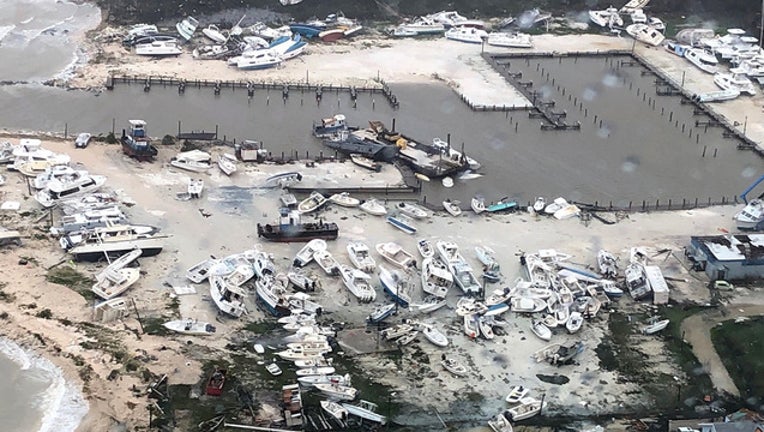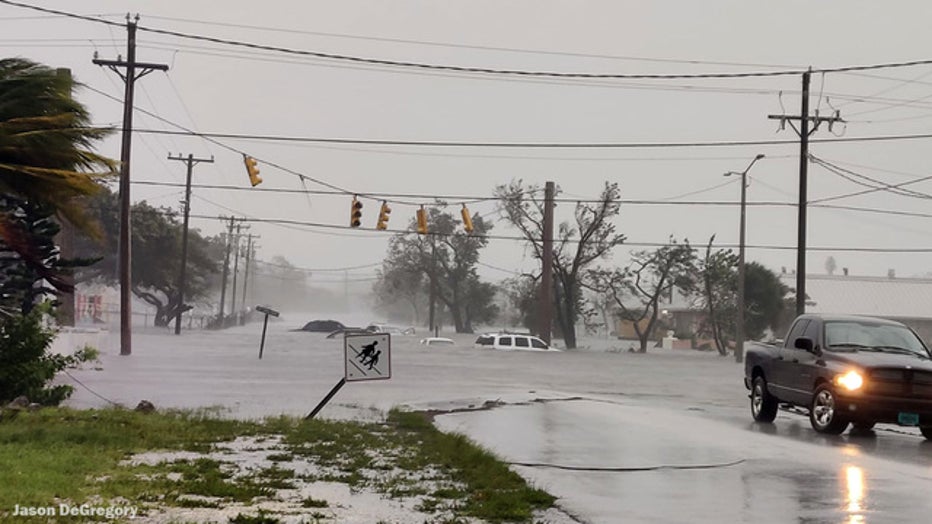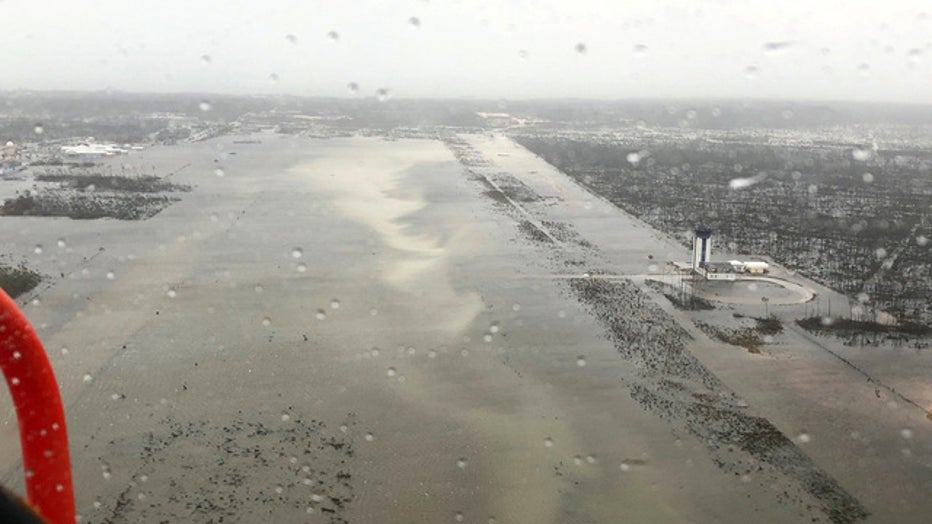"Total devastation": Hurricane Dorian levels parts of the Bahamas

The Marsh Harbour Boatyards (U.S. Coast Guard Air Station Clearwater)
FREEPORT, Bahamas - Relief officials reported scenes of utter ruin Tuesday in parts of the Bahamas and rushed to deal with an unfolding humanitarian crisis in the wake of Hurricane Dorian, the most powerful storm on record ever to hit the islands. At least five deaths were reported, with the full scope of the disaster still unknown.
The storm's punishing winds and muddy brown floodwaters destroyed or severely damaged thousands of homes, crippled hospitals and trapped people in attics.
"It's total devastation. It's decimated. Apocalyptic. It looks like a bomb went off," said Lia Head-Rigby, who helps run a local hurricane relief organization and flew over the Bahamas' hard-hit Abaco Island. "It's not rebuilding something that was there; we have to start again."
She said her representative on Abaco told her that "there's a lot more dead" and that the bodies were being gathered.
Emergency authorities, meanwhile, struggled to reach victims amid conditions too dangerous even for rescue workers, and urged people to hang on.
"We wanted to go out there, but that's not a risk we're capable of taking," Tammy Mitchell of the Bahamas' National Emergency Management Agency told ZNS Bahamas radio station. "We don't want people thinking we've forgotten them. ... We know what your conditions are. We know if you're stuck in an attic."
Some of the first post-storm images out of Grand Bahama showed children and elderly people huddled in the shovel of a huge bulldozer as it cut through muddy waters and evacuated them to a safer area.

(Jason DeGregory)
Practically parking over a portion of the Bahamas for a day and a half, Dorian pounded the northern islands of Abaco and Grand Bahama with winds up to 185 mph (295 kph) and torrential rain before finally moving into open waters Tuesday on a course for Florida. Its winds were down to a still-dangerous 110 mph (175 kph). The system was drifting north at 6 mph (10 kph).
Over 2 million people along the coast in Florida, Georgia and North and South Carolina were warned to evacuate. While the threat of a direct hit on Florida had all but evaporated, Dorian was expected to pass dangerously close to Georgia and South Carolina -- and perhaps strike North Carolina -- on Thursday or Friday.
Even if landfall does not occur, the system is likely to cause storm surge and severe flooding, the U.S. National Hurricane Center said.
"Don't tough it out. Get out," said U.S. Federal Emergency Management Agency official Carlos Castillo.
In the Bahamas, Red Cross spokesman Matthew Cochrane said more than 13,000 houses, or about 45% of the homes in Grand Bahama and Abaco, were believed to have been severely damaged or destroyed. U.N. officials said more than 60,000 people on the hard-hit islands will need food, and the Red Cross said some 62,000 will need clean drinking water.
"What we are hearing lends credence to the fact that this has been a catastrophic storm and a catastrophic impact," Cochrane said.
Lawson Bates, a staffer for Arkansas-based MedicCorps, flew over Abaco and said: "It looks completely flattened. There's boats way inland that are flipped over. It's total devastation."

Leonard M. Thompson International Airport in Marsh Harbor (Coast Guard Air Station Clearwater)
The Red Cross authorized a half-million dollars for the first wave of disaster relief, Cochrane said. And U.N. humanitarian teams stood ready to go into the stricken areas to help assess the damage and the country's needs, U.N. spokesman Stephane Dujarric said. The U.S. government also sent a disaster response team.
Abaco and Grand Bahama islands, with a combined population of about 70,000, are known for their marinas, golf courses and all-inclusive resorts. To the south, the Bahamas' most populous island, New Providence, which includes the capital city, Nassau, and has over a quarter-million people, suffered little damage.
The U.S. Coast Guard airlifted at least 21 people injured on Abaco. Rescuers also used jet skis to reach some people as choppy, coffee-colored floodwaters reached roofs and the tops of palm trees.
"We will confirm what the real situation is on the ground," Health Minister Duane Sands said. "We are hoping and praying that the loss of life is limited."
Sands said Dorian rendered the main hospital on Grand Bahama unusable, while the hospital in Marsh Harbor in Abaco was in need of food, water, medicine and surgical supplies. He said crews were trying to airlift five to seven kidney failure patients from Abaco who had not received dialysis since Friday.
The Grand Bahama airport was under 6 feet (2 meters) of water.
As of 5 p.m. EDT, Dorian was centered about 75 miles (105 kilometers) north of Freeport and 105 miles (170 kilometers) east of Vero Beach, Florida. It was moving northwest at 6 mph (7 kph). Hurricane-force winds extended up to 60 miles (95 kilometers) from its center.
The coastline from north of West Palm Beach, Florida, through Georgia was expected to get 3 to 6 inches of rain, with 9 inches in places, while the Carolinas could get 5 to 10 inches and 15 in spots, the National Hurricane Center said.
NASA satellite imagery through Monday night showed some places in the Bahamas had gotten as much as 35 inches (89 centimeters) of rain, said private meteorologist Ryan Maue.
Parliament member Iram Lewis said he feared waters would keep rising and stranded people would lose contact with officials as their cellphone batteries died.
Dorian also left one person dead in its wake in Puerto Rico before slamming into the Bahamas on Sunday. It tied the record for the strongest Atlantic storm ever to hit land, matching the Labor Day hurricane that struck Florida Gulf Coast in 1935, before storms were given names.
Scientists say that climate change generally has been fueling more powerful and wetter storms but that linking any specific hurricane to global warming would require more detailed study.
Across the Southeast, meanwhile, interstate highways leading away from the beach in South Carolina and Georgia were turned into one-way evacuation routes. Several airports announced closings, and hundreds of flights were canceled. Walt Disney World in Orlando closed in the afternoon, and SeaWorld shut down.
Police in coastal Savannah, Georgia, announced an overnight curfew. North Carolina Gov. Roy Cooper ordered a mandatory evacuation of the dangerously exposed barrier islands along the state's entire coast.
Having seen storms swamp his home on the Georgia coast in 2016 and 2017, Joey Spalding of Tybee Island decided to empty his house and stay at a friend's apartment nearby rather than take any chances with Dorian.
He packed a U-Haul truck with tables, chairs, a chest of drawers, tools -- virtually all of his furnishings except for his mattress and a large TV -- and planned to park it on higher ground. He also planned to shroud his house in plastic wrap up to shoulder height and pile sandbags in front of the doors.
"In this case, I don't have to come into a house full of junk," he said. "I'm learning a little as I go."
In Folly Beach, South Carolina, many restaurants and shops wasted no time in boarding up, but some hurricane-hardened residents had yet to decide whether to heed the evacuation order.
"If it comes, it comes. You know, God always provides, y'all," Sammye Wooded said.
------
Coto reported from San Juan, Puerto Rico, and Weissenstein from Nassau, Bahamas. Associated Press reporters Tim Aylen in Freeport; Russ Bynum in Georgia; and Seth Borenstein in Washington contributed to this report.

